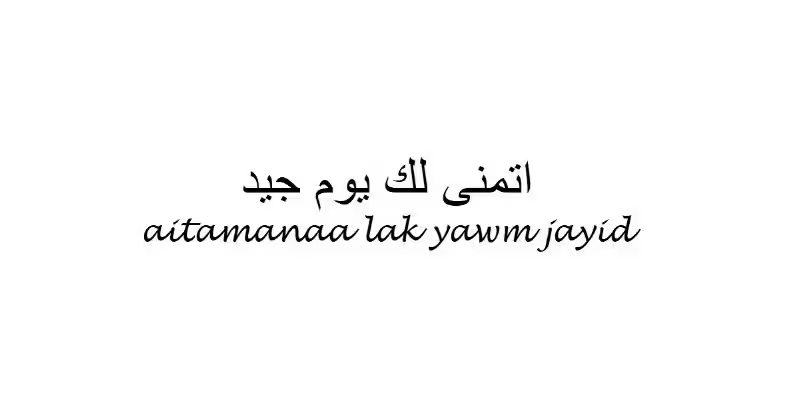
In many cultures, saying “God bless you” after someone sneezes is a common courtesy, a simple expression of good wishes and concern for their well-being. In the Arabic language, conveying this sentiment carries a deeper meaning, reflecting the rich cultural tapestry and values of the Arab world.
Expressing Blessings in Arabic: More Than Just Translation
While there are direct translations of “God bless you” in Arabic, the language often goes beyond simple word-for-word equivalency. It delves into nuances, conveying different levels of respect, formality, and intention. Understanding these variations helps you engage authentically with those who speak Arabic.
Common Arabic Phrases for “God Bless You”
Here’s a breakdown of some key phrases and their implications:
1. “Jazāk Allāhu Khairan” (جَزَاكَ اللهُ خَيْرًا): This is the most versatile and commonly used phrase, translating to “May Allah reward you with good.” It’s a powerful expression of gratitude and a wish for divine blessings upon the recipient. It’s appropriate in most situations, demonstrating respect and politeness.
2. “Barak Allahu Fīk” (بَارَكَ اللهُ فِيك): This phrase means “May Allah bless you,” highlighting the bestowal of blessings upon the individual. It’s a general expression of goodwill, suitable for casual settings or expressing quick blessings.
3. “Ya ‘Afiaka Allāhu” (يَا عَافِيَكَ اللهُ): This translates to “May Allah grant you health,” focusing specifically on the wish for the sneezer’s well-being. It’s a more direct expression of concern, suitable for formal settings or when you want to convey genuine care.
4. “Ḥiyaa’ Allahu” (حَيَّاهُ اللهُ): This phrase means “May Allah keep you alive,” expressing a wish for long life and good health. It’s less common but can be used in formal settings or when you want to convey a deeper sense of blessing.
5. “Afi’a” (عافِيَة): This is a shortened version of “Ya ‘Afiaka Allāhu,” simply meaning “good health” or “bless you.” It’s a casual and informal expression, suitable for close friends or family.
Beyond the Words: Cultural Considerations
Beyond the phrases themselves, Arabic culture emphasizes politeness and respect.
- Adding “Inshā’Allah” (إن شاء الله), meaning “if Allah wills it,” at the end of any phrase adds a touch of humility and acknowledges that blessings come from Allah.
- Responding with “Wa ‘Antum” (وَأَنْتُمْ), which means “and you too,” extends the blessing reciprocally, demonstrating good manners and strengthening the social bond.
Engaging Authentically: Language as a Bridge
Learning how to say “God bless you” in Arabic is more than just a linguistic exercise. It’s a step towards understanding the cultural nuances and values that shape the Arab world. By embracing these expressions and their underlying meanings, you can build meaningful connections and communicate with respect and authenticity.
Frequently Asked Questions about “God Bless You” in Arabic
How do I say “God bless you” in Arabic?
The most common way to say “God bless you” in Arabic is “الله يبارك فيك” (Allah yubarik feek) for males and “الله يبارك فيكي” (Allah yubarik feeki) for females.
What does “God bless you” mean in Arabic?
It literally means “May Allah bless you.” It’s a polite way to express well wishes and blessings.
When do you say “God bless you” in Arabic?
It is often said after someone sneezes, similar to English. It can also be used as a polite response to congratulations, compliments, or good news.
Are there other ways to say “God bless you” in Arabic?
Yes, there are other phrases that also convey the same sentiment, such as:
- “Jazāk Allāhu Khairan” (جَزَاكَ اللهُ خَيْرًا) – “May Allah reward you with good.”
- “Ya ‘Afiaka Allāhu” (يَا عَافِيَكَ اللهُ) – “May Allah grant you health.”
- “Ḥiyaa’ Allahu” (حَيَّاهُ اللهُ) – “May Allah keep you alive.”
Should I use “May Allah” in Arabic?
While “May Allah” is used in English to express wishes, it’s not common in Arabic. The phrase “Allah yubarik feek” directly conveys the blessing without using “May Allah.”
How do I pronounce “God bless you” in Arabic?
The article provides pronunciations for the Arabic phrases. You can also find pronunciation guides online or ask a native speaker.
What are some cultural considerations when saying “God bless you” in Arabic?
It’s important to consider your relationship with the person and the context. Using “Inshā’Allah” (إن شاء الله) – “if Allah wills it” – at the end of any phrase adds humility. It’s also common to respond with “Wa ‘Antum” (وَأَنْتُمْ) – “and you too” – to reciprocate the blessing.
- “Jazāk Allāhu Khairan” (جَزَاكَ اللهُ خَيْرًا): A formal and widely used expression meaning “May Allah reward you with good.”
- “Barak Allahu fīk” (بَارَكَ اللهُ فِيكَ): A more general and informal way to say “May Allah bless you.”
- “Allah yihfik” (الله يَحْفِظْك): Meaning “May Allah protect you,” commonly used after someone sneezes.
- “Ya ‘Afiaka Allāhu” (يَا عَافِيَكَ اللهُ): This translates to “May Allah grant you health,” expressing concern for the sneezer’s well-being.
- “Barak Allahu Fīk” (بَارَكَ اللهُ فِيك): Meaning “May Allah bless you,” emphasizing the bestowal of blessings upon the individual.
- “Ḥiyaa’ Allahu” (حَيَّاهُ اللهُ): Translates to “May Allah keep you alive,” expressing a wish for long life and good health.
- “Afi’a” (عافِيَة): A shortened version of “Ya ‘Afiaka Allāhu” meaning “good health” or “bless you.”
- “Inshā’Allah” (إن شاء الله): Meaning “if Allah wills it,” adds humility and emphasizes the acceptance of Allah’s will.
- “Wa ‘Antum” (وَأَنْتُمْ): Means “and you too,” acknowledging the blessing and extending it reciprocally.







